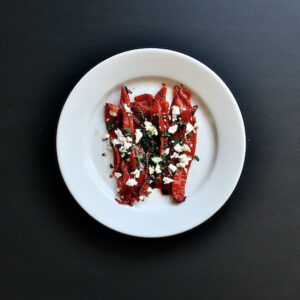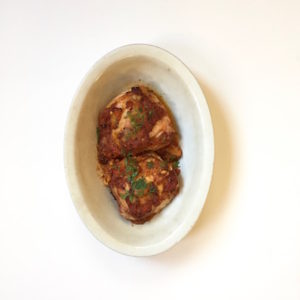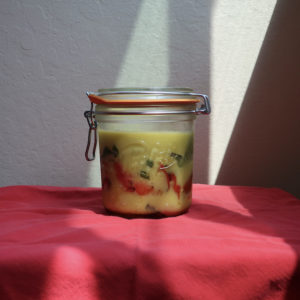Grilled Peppers
Lulu scorns the barbaric habit of turning peppers over a gas flame to blister the skins and holding them beneath running water to rub the skins off.
Richard Olney, Lulu’s Provençal Table
Since discovering roasted peppers–and realizing how easy it is to prepare them–I’ve gotten addicted. Sometimes I just roast a few for fun in my spare time. It is amazing how a humble bell pepper can get transformed through this process.
Mollie Katzen, Still Life With Menu Cookbook
A large number of red peppers is a beautiful sight. Even more beautiful is the sight of them cut into strips and ready to be simmered in a large pot of fruity olive oil.
Laurie Colwin, “Red Peppers,” Home Cooking
If you count yourself amongst the unfortunate souls lacking Lulu Peyraud’s enormous kitchen fireplace–indeed, perhaps you also lack an entire wine-producing Domaine–take heart. It is still entirely possible to grill a pepper. Should this make you barbaric, you are nevertheless in good company.
Consider: Volume 2 of Canal House Cooking features a photograph of eight fat red peppers charring atop four gas burners. Christopher Hirsheimer and Melissa Hamilton are not people I would call barbaric. Were I so fortunate to meet them, I would be more inclined to behave a lá Wayne and Garth meeting Aerosmith. And yes, I realize how hopelessly outdated that reference is. But it’s true.
Like their close associate the tomato, the pepper is a resolutely seasonal veggie: come October, Californians must get their fresh peppers from distant Holland. We of the Berkeley Hippie Freak Flag variety, fretting over petrodollars and eating locally, thus wait until June rolls around again. Some of us feed our pepper addictions with jars of roasted Spanish peppers, but these cost just a bit less than Black Sabbath farewell tour tickets. (Yeah, really.) Others put up jars and jars of marinated bell peppers. (A later post). Most of us just suffer pangs of longing. For the pepper is indeed like the tomato: there is no substitute for the real thing.

Detractors discuss the pepper’s digestibility, or lack thereof. It is a fact that humans over age ten struggle to digest raw pepper. Then again, recalling the volume and variety of foods blithely consumed in youth is a needlessly depressing exercise. Better to focus on the pepper.
Large doses of heartburn remedies aside, it is cheaper and tastier to apply high heat to the pepper’s exterior. And with all apologies to Mr. Olney, those of us possessing standard ovens may successfully use them. Having placed peppers on electric burners, gas burners, and beneath broilers, I can safely report my finest pepper grilling results occur using gas burners. Should you lack gas, apply electric. I’ve tried broiling–in fact, I tried again yesterday–and experienced exploding pepper syndrome, wherein valuable, delectable pepper juices flew about the oven space, requiring energetic cleanup. One rather prefers consumption of said juices, so overlook the mess this creates stovetop, grab your tongs, and join us barbarians.

What about barbeques? A fine query. Sadly, I haven’t one. Doubtless real fire is the best way to grill peppers. Have at it. Gloat quietly.
—
A note about quantity: I like to broil about a pound at a time, then keep them under olive oil in the fridge. Provided the peppers are kept under oil, and fished out with a clean fork, they’ll keep for about four weeks. You can also replenish the peppers, provided you keep everything–the container, the lid–very, very clean.
How to eat these?
On sandwiches–say, turkey on Ciabatta with mustard, mayo, and nice greens–the way I am right this minute. On a tortilla pizza. On a real pizza. They cry out for the company of mozzarella and goat cheeses. Laurie Colwin gives a recipe for them in potato salad. In One Good Dish, David Tanis scorches peppers and onions dry in a pot, which I might just make for dessert.

—
Grilled Peppers
yield: as many as you like
prep time: approximately 1 hour: grilling and peeling time included
red and yellow mini or regular size bell peppers
olive oil
one crushed garlic clove (optional)
salt (optional)
Note that if you are using mini-peppers, they will enjoy falling through your oven burner grates, catching fire, and causing your smoke alarm to go off. They also make a real mess. You may prefer to purchase regular bell peppers.
Lay peppers on burners. Turner burners to medium high. Turn peppers with tongs, taking care not to burn yourself over the exposed flame. You may wish to run the exhaust fan or open a window.
When peppers have blackened nicely, remove to cutting board to cool completely. Some people place peppers in plastic bags. I don’t. I do not like eating plastic.
When peppers are cool enough to handle, peel over a bowl or container to catch the juices. This is a messy, annoying job, as the little seeds catch. Try not to give in to temptation to rinse peppers under water, which also rinses away the delicious pepper flavor.
Tenderly lay your peeled peppers in an immaculate container. This can be a jar or Pyrex-type container. Once the peppers are peeled, pour olive oil over to cover. Add garlic and salt, if using.
Cover and refrigerate.
Retrieve peppers with a clean fork. Keep peppers covered with oil. Peppers will keep up to one month.





